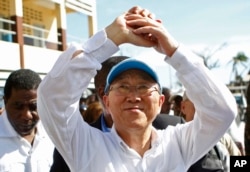U.N. Secretary-General Ban Ki-moon said Saturday that Hurricane Matthew left Haiti in a "heartbreaking" situation, with devastation across a country that already was extremely impoverished.
Ban toured Haiti's southern coast, which were hit hardest by the Category 4 hurricane's extremely powerful winds and rain.
"I met so many displaced persons, young people, women who were pregnant and sick people. It was heartbreaking," the secretary-general said after visiting an emergency shelter for families whose homes were destroyed less than two weeks ago.
Shortly before Ban's arrival at a U.N. base in Les Cayes, a minor skirmish broke out between residents and U.N. peacekeepers when trucks carrying food aid arrived. The U.N. force fired tear gas to restore order.
A World Health Organization coordinator said two containers loaded with supplies from the World Food Program also were looted outside the U.N. base on Haiti's southern coast.
Over 1 million need help
Hurricane Matthew killed more than 500 people and left more than 1 million in need of emergency assistance when it hit Haiti on October 4. More than 175,000 people lost their homes, and valuable farmland was destroyed.
"We will mobilize all the resources to help you," Ban told hurricane victims at a local school being used as a shelter. "Stay strong."
He departed Haiti for Ecuador's capital, Quito, late Saturday.
Tensions are high in southwest Haiti, where many residents have not yet received emergency food aid and potable water is unavailable.
The nation of 11 million also has been racked by a cholera epidemic that began in the aftermath of a massive earthquake in 2010. The disease has killed more than 10,000 people and sickened more than 800,000 since then, and hundreds of new cases are being reported every week.
'Moral responsibility'
Ban said Saturday that the United Nations has "a moral responsibility" to help Haiti end the cholera outbreak, echoing a statement he made in Haiti more than two years ago. However, he did not change the U.N.'s refusal to admit responsibility for the outbreak.
Scientific evidence and an independent panel of experts convened by the U.N. have strongly suggested that cholera was inadvertently brought to Haiti during the months after the January 2010 earthquake by Nepalese peacekeepers. By refusing to admit responsibility for the cholera outbreak, the United Nations has been able to reject claims for compensation and other legal action brought by victims of the disease and their relatives.
During the hurricane and in its aftermath, heavy rains caused rivers and outdoor latrines to overflow, creating perfect conditions for spreading cholera. The waterborne bacterial disease produces severe diarrhea, which can be fatal to the very young, the elderly and other people weakened by other hardships. It generally is caused by drinking contaminated water or eating contaminated food.
Elections set
Haiti announced Friday that its long-delayed presidential and legislative elections would be held November 20, after a delay caused by Hurricane Matthew.
The Provisional Electoral Council said the second round of elections was scheduled for January 29.
Haiti's elections had been scheduled for last week. The country's previous elections, in 2015, were canceled because of violence and fraud, leaving Haiti in political limbo.
The most recent president, Michel Martelly, left office in February and has not been replaced. Parliament elected Jocelerme Privert as interim president, but his 120-day mandate expired in June.






